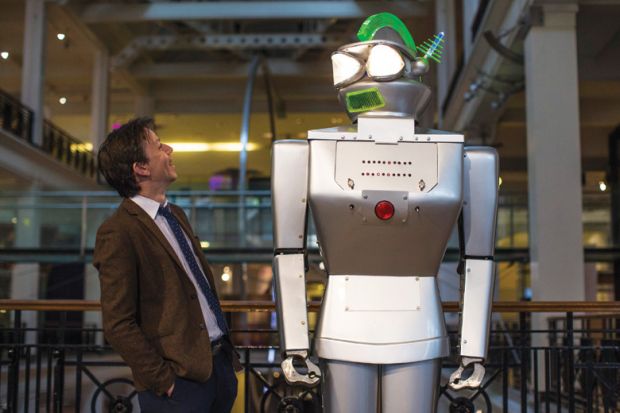Universities must not teach degree courses that are too specialised because of the risk that increasingly intelligent machines will put their graduates out of a job, the new vice-provost for research at Imperial College London has warned.
Nick Jennings, who is a leading expert in artificial intelligence and was the UK government’s chief scientific adviser for national security for the past six years, said that universities instead needed to give their students a deep understanding of a subject so that they can continue to learn in the future.
His comments add to the debate around whether increasingly capable AI will replace white-collar jobs in the legal, financial analysis and accountancy sectors, and what universities need to do so their graduates still have an edge over machines.
“I think you need to be clear where you’re teaching skills versus core understanding,” Professor Jennings told Times Higher Education.
Universities cannot end up “churning out” graduates who have specialised in a skill that could be made obsolete “and can’t understand much else”, he warned.
“What we want is that set of transferable skills” rather than graduates who have a particular skill such as being able to write software in only one programming language, he said. “If you specialise your degree in something and then that something is fully automated that’s not the place to be in.
“As a computer scientist I learned to programme in a language that no one uses these days,” he continued.
“But I still know how to programme. I don’t know how to programme in today’s modern languages, but I could do because my basic training has taught me how to programme in general."
Video: Nick Jennings in conversation with THE
Despite his warnings that universities need to think about their curriculum in response to automation, Professor Jennings said that most “good universities” in the UK were already teaching “broad-based” skills.
He is also more cautious than some commentators about the prospects of AI eliminating huge numbers of human jobs. “I don’t think it’s going to lead to mass unemployment,” he said.
“Some jobs may disappear, many jobs will be augmented by it,” he continued. “I see AI as being a collaboration technology, something that will assist and augment, rather than replace, many people.”
However, he added that “some of the routine, processing jobs – some of the simple data analysis, some of the simple searches that people do that are graduate-entry jobs in some cases can be automated away”.
In his new role at Imperial, which he started in April, Professor Jennings said that one of his main aims was to encourage academics to do more interdisciplinary research.
“The sole discipline work, we’re really good at,” he said of Imperial. “However, increasingly we’re looking to tackle grander global challenges and that requires people from different disciplines to come together.”
To make this happen, Imperial has created a number of global institutes, focusing on areas such as the future of energy, security science and climate change, which are given money and PhD scholarships to encourage interdisciplinary research, he explained.
But Professor Jennings stressed that there was no point trying to force academics together against their will. “The excellent mathematician who wants to carry on with their stuff – my interaction with him or her is in reality limited,” he said.
“There are still academics who just want to do what they’ve always done and carry [on] down that particular furrow, but there are increasing numbers of people who care about bigger challenges,” he continued.
Register to continue
Why register?
- Registration is free and only takes a moment
- Once registered, you can read 3 articles a month
- Sign up for our newsletter
Subscribe
Or subscribe for unlimited access to:
- Unlimited access to news, views, insights & reviews
- Digital editions
- Digital access to THE’s university and college rankings analysis
Already registered or a current subscriber? Login








